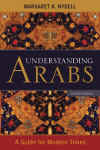"Who are the Arabs?" seems a simple question but the answer can be more complicated than it looks ...
"An Arab is whoever speaks Arabic, wishes to be an Arab and calls himself an Arab."
–Sati al-Husri"Those who belong to the Arab ethnic group, the Arab people or the Arab nation, speak a form of Arabic and consider it their "natural" language; regard the history and cultural characteristics of the Arabs as their inheritance; assert an Arab identity or consciousness."
–Maxime Rodinson"By 'Arab' I mean whoever describes himself thus … there, where he is – in his history, his memory, the place where he lives, dies and survives. There, where he is – that is to say, in the experience of a life which is both tolerable and intolerable for him."
–Abdelkebir Khatibi
Language
A shared language – Arabic– is generally recognised as one of the defining characteristics of Arabs and the word "Arab" itself may be derived from a verb which means to "speak clearly" (i.e. be easily understood by other Arabs). However, many Arabs speak local dialects which are not always mutually intelligible.
Within the Arab countriesthere are also distinct groups - the Berbers, the Kurds, etc – whose main language is not Arabic, though they may have absorbed some of the prevailing Arab culture.
Religion
There is no doubt that Islam has played a major part in shaping Arab culture. The prophet of Islam was an Arab and Arabic is the language of its holy book, the Qur'an; the Arab people were the nucleus for the expansion of Islam. But it would be wrong to assume that Muslims are mainly Arabs or that Arabs are necessarily Muslims.Today, there are almost a billion Muslims worldwide; the largest group live in the Indian sub-continent, and only 20% of the total are Arabs.
Among the Arabs, there are substantial Christian communities in Egypt, Lebanon, Syria and Palestine. Many of the older Arab cities also have a Jewish quarter, though the number of Jews in Arab countries today is small.
From the 1970s onwards, the decline of Arab nationalism (see below) brought a shift towards religion and the rise of political Islam. As a consequence of that, many Arabs view their Muslim identity as more important than their Arab identity.
Arab nationalism
Arab nationalism views the inhabitants of the Arab region, from the Atlantic to the Arabian Sea, as a single nation bound together by a common linguistic, cultural, religious, and historical heritage.
Arab nationalism developed as the Ottoman Empire declined in the early 20th century but was especially prevalent in the 1950s and 1960s. It strongly opposed western imperialism and western influence more generally. The creation of Israel and its occupation of Arab lands also became a rallying point for Arab nationalism.
Pan-Arabism is closely related to Arab nationalism and aspires to political unity among Arabs. The Egyptian leader Gamal Abdel Nasser was the figure most closely associated with Pan-Arabism. After his death, Hafez al-Assad in Syria, Saddam Hussein in Iraq and Muammar al-Qaddafi in Libya sought to take his place.
The rapid and overwhelming defeat of Arab armies by Israel in the 1967 war proved a huge psychological blow prompting much agonised reflection by Arab writers and thinkers. In contrast to earlier glories celebrated by nationalism, this added a further dimension to the Arab identity – a shared perception of suffering and victimhood.
'Arab' countries
There are differing views about which countries should be regarded as "Arab". For the purposes of this website, al-bab decided to consider "Arab" countries as those belonging to the Arab League. They are: Algeria, Bahrain, Comoros, Djibouti, Egypt, Iraq, Jordan, Kuwait, Lebanon, Libya, Mauritania, Morocco, Oman, Palestine, Qatar, Saudi Arabia, Somalia, Sudan, Syria, Tunisia, the United Arab Emirates and Yemen.
|
Understanding Arabs: by Margaret Nydell. Purchase from amazon.com or amazon.co.uk |
 |


